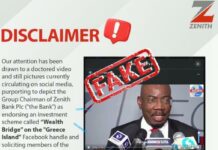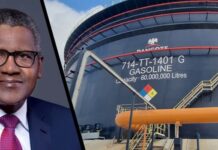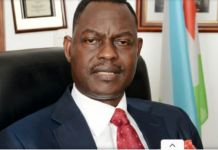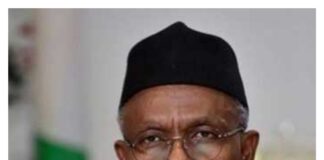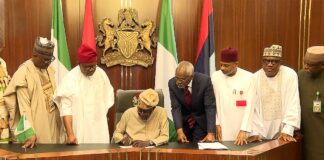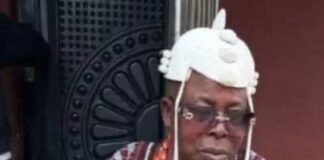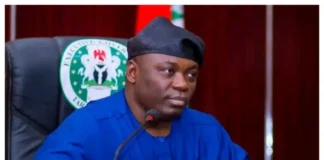Peters and Nadabo Energy are facing a 21-count charge bordering on obtaining money under false pretence, diversion of Federal Government funds and forgery to the tune of N761,628,993.84.
Justice S. S. Ogunsanya of the Lagos State High Court sitting in Ikeja, Lagos, on Wednesday, September 22, 2021, admitted in evidence several documents tendered by the Economic and Financial Crimes Commission, EFCC, against one Abubakar Ali Peters and his company, Nadabo Energy Limited, in an alleged N761.6m fraud.
Nadabo Energy and Mr Peters are being prosecuted by the EFCC, over a 21-count charge bordering on obtaining money under false pretence, diversion of Federal Government funds and forgery to the tune of N761,628,993.84.
One of the counts reads: “Nadabo Energy Limited and Abubakar Ali Peters, on or about 26th day of September, 2011 in Lagos, within the Ikeja judicial division, fraudulently obtained the sum of N761,628,993.84 from the Federal Government by falsely representing that the sum represented the subsidy accrued to Nadabo Energy Limited under the Petroleum Support Fund for the importation of 16,808,064 litres of Premium Motor Spirit (PMS), which Nadabo Energy Limited purported to have purchased from Delano Petroleum Corporation Akara Tortola British Virgin Island, and transported the 16,808,064 litres through MT Gotland Carolina (mother vessel) and MT Sonia (daughter vessel) to Nigeria, whereas Nadabo Energy Limiter only imported 7,953,962 litres of PMS from Delany Petroleum Corporation Akara Tortola British Virgin Island and transported 7,953,962 litres of PMS through MT Gotland Carolina (mother vessel) and MT Songa (daughter vessel) to Nigeria.”
The offence, which involves obtaining by false pretence, is contrary to Section 1 (3) of the Advance Fee Fraud and Other Related Offences Act No 14 of 2006.
He pleaded “not guilty” to the charges when he was arraigned on October 7, 2015, thereby prompting the commencement of his trial.
At the resumed sitting today, the Executive Chairman of the EFCC, Abdulrasheed Bawa, continued his examination-in-chief as the second prosecution witness.
Led in evidence by the prosecuting counsel, S.K. Atteh, the prosecution, through the witness, tendered in evidence several documents, as Mr Bawa further testified to the findings of the investigation he led into the alleged fraud.
The prosecution witness said: “In 2015, we received a complaint from the then Minister of Petroleum Resources, Mrs. Diezani Alison-Madueke, alleging fraud in the importation of PMS by Nadabo, and equally received a petition from Falana & Falana Chambers dated 17th of January, 2012.”
The petitions, which also included a complaint from a civil society group, he said, formed the bedrock of the investigation into Nadabo Energy Limited.
However, when the prosecution sought to tender the documents in evidence, the defence counsel, E.O. Isiramen, raised objections to their admissibility.
Citing the sections of the Evidence Act and other authorities, he argued that the documents, referencing the letter of complaint emanating from the civil group, did not meet the criteria stated in the Act, particularly that “there is no proof of payment for certification in line with established judicial authority that certification requires payment.”
Opposing the objection, Mr Atteh cited the case of Sule Lamido vs FRN, arguing that, “the Commission is an agency of the Federal Government and has no prescribed fee to be paid for certifying documents emanating from it.”
After listening to the arguments, the trial judge dismissed the objection and admitted the documents as exhibits P2 to P5.
Thereafter, Bawa told the Court that a Special Team was constituted by the EFCC to probe the subsidy regime.
He said: “The first port of call was the Petroleum Products Pricing Regulatory Agency, PPPRA.”
He also noted that after meeting with PPPRA, the defendant was among many involved in importing petroleum.
“Based on intelligence from PPPRA, we set out to get more intelligence.
“All the banks involved were written to, including the Central Bank of Nigeria, CBN, the Debt Management Office, DMO, Nigeria Port Authorities, NPA, NIMASA, the Nigerian Navy and many other companies involved in dealing with Nadabo Energy Limited.
“We invited all marketers to come forward with the documents they submitted to PPPRA.
“In this particular case, we wrote to him and his company, inviting them to bring forward all documents submitted.
“On 28th January, 2012, he came to our office and I personally interviewed him,” he said.
He added that the PPPRA was, thereafter, contacted to furnish the EFCC with the certified true copies of all documents submitted to it by the defendant.
“They responded in writing attaching the documents submitted by the defendant.
“When we received it, we compared it with the ones he submitted to us and found out that he claimed that he imported 6,000 MT each with two Letters of Credit financed by then Spring Bank Plc, which was not the case,” he further said.
Mr Bawa, in his further elaborate testimony, told the Court that in the course of the investigation, which began in 2012, the EFCC had several correspondences with the DMO, PPPRA, Enterprise Bank, Corporate Affairs Commission, CAC, Staco Insurance Company, Delaney Petroleum Corporation, Skye Bank and Q & Q Services Nigeria Limited.
He said based on the findings of the investigation team, the PPPRA was asked to recompute the money to be paid to the defendant and it was found that he was overpaid N761,628,993.84 as subsidy funds for PMS he claimed to have imported.
According to Mr Bawa, the defendant allegedly used forged documents to claim subsidy funds for 12,000MT of PMS, whereas only about 6,000 MT was imported by the defendant.
Atteh sought to tender the series of correspondences between the EFCC and the various companies and organisations contacted in the course of investigation.
According to Mr Atteh, the companies and organisations supplied the EFCC with documents indicating that fraudulent documents were used by the defendant to obtain subsidy funds from the government.
Mr Isiramen, however, raised objections to their admissibility, raising earlier arguments.
Ruling on the objections, Justice Ogunsanya only upheld Isiramen’s argument to the admissibility of the letter of the EFCC to the Registrar of the CAC, being a photocopy with no certification, but admitted all the other documents marking them as Exhibits P8 to P25.
Thereafter, Bawa told the Court that Abubakar was invited to the EFCC and he gave statements on January 28, 2012 and February 8, 2012.
As Atteh sought to tender the statements, Isiramen again raised objections, arguing that “he was detained in EFCC custody and subjected to inhuman conditions and he was not given water, no food.”
Atteh, however, told the Court that the defendant was never given an inhuman treatment and that the statements were, in fact, not confessional statements.
Thereafter, the trial judge dismissed the objection and admitted the statement in evidence marked as Exhibits P26 and P27.
The case has been adjourned till November 1 and 2, 2021 for “cross-examination of the witness”.
The defendant is also standing trial before Justice C.A. Balogun of the Lagos State High Court sitting in Ikeja for an alleged N1.4bn subsidy fraud due for October 5, 2021 for continuation of trial.



